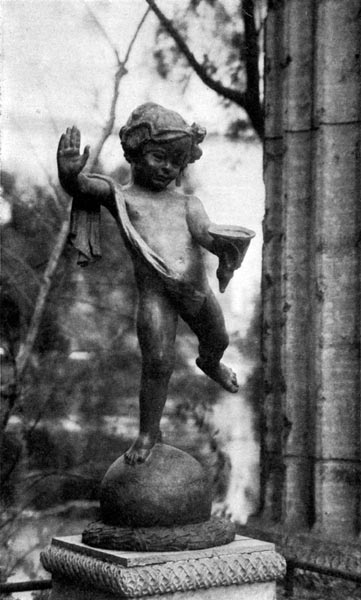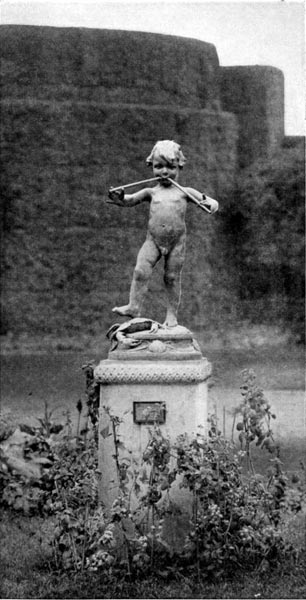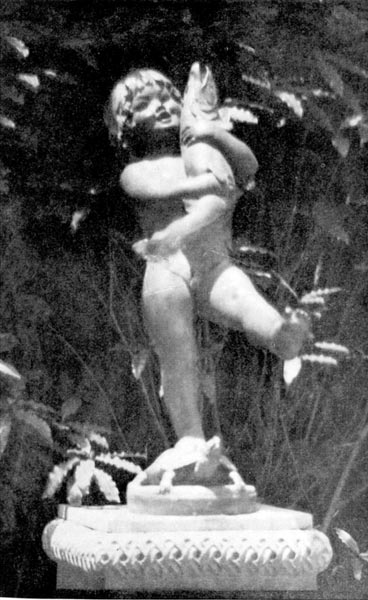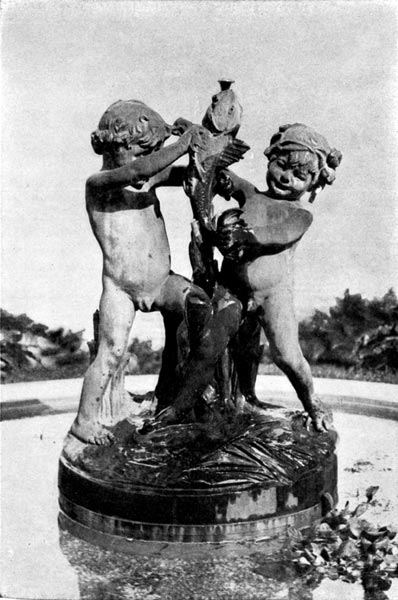| Home -> Paul Elder -> Little Bronze Playfellows - The Road to Fairyland | |||
 Flying Cupid From the Next Pedestal By Janet Scudder |
|||
|
The Road to Fairyland
Eleanor and Eleanor's Mother and the Pretty-Young-Lady-with-Jingling Earrings and Eleanor's Aunt Kate, who knew all about everything and could explain even to Father and Mother, had spent the day at the Exposition. Now the buildings were closing for the evening and soft, bright blue twilight, spangled with the first stars and glimmering with the early moon, filled the quiet courts and flowery avenues and made Eleanor say, "Oh! Isn't it beautiful!" and dance for joy until her curls bobbed. The great tower and the smaller towers were glowing red like huge lanterns. Just enough lights had appeared to make shimmers and gleams in the sheets of water that fell from the fountains. The quiet pools had become mirrors; Eleanor looked into them and saw the buildings all turned magically upside down. It was just as if the Evening Fairy had waved her wand and turned the world into Fairyland. "Is this why we stayed here for the evening," asked Eleanor, "to see how lovely it is now?" "Not tired, dear?" "No, Mother - not very. I just wanted to know why we stayed; because Aunt Kate said she thinks there will be no fireworks tonight." Eleanor had once been allowed to wait for the fireworks and had found them most exciting. "We're going to do the Fine Arts, honey. The Palace of Fine Arts is open tonight and - you're not tired, dear?" For Eleanor had sighed a little sigh without meaning to. She was not tired - not tired enough to admit it, at least. But "doing the Fine Arts" did not seem very attractive to her. She had tried it before, by day, and it meant rooms and rooms and rooms of pictures; very pretty ones to be sure, but too many for a little girl to see all at once without growing bewildered. And it meant Aunt Kate's stopping before almost every one - or so it seemed to Eleanor - and saying queer long words, like Divisionist, Futurista, Boccionist, Munich School, while the Pretty-Young-Lady-with-Jingling-Earrings exclaimed, "I know I shall never remember a word of it!" and Dear Mother said, "Wonderful! It is so interesting to know these things, Kate!" Eleanor thought she'd much prefer the twilight courts and the fairy palaces. She wished she had another child with her and permission to run through the beautiful Colonnade and play Fairyland on the shore of the lagoon. Aunt Kate, too, noticed her little niece's sigh and said, "It is really too bad. She doesn't seem to take any natural interest in Art. But these things can be developed. Now, listen well, Eleanor, and try to understand." They entered the great portal of the Fine Arts Palace. Then Mother and Aunt Kate and the Pretty-Young-Lady-with-Jingling-Earrings all became happy and excited and Aunt Kate cried: "What luck! Here comes Waldemar! He can tell us just what to see." The Pretty Young Lady looked as if she could tell what he had come there to see if she chose to do so. Eleanor was happy, too, for the young man who hurried forward to meet them was her very favorite grown-up, except, of course, Father and Mother. Other grown-ups thought him queer and eccentric; she often heard them say so. But they forgave him for not being just like themselves because he was a very famous artist and it was an honor to know him. His hair was a little longer than Father's and as curly and golden as Eleanor's own. There was a little bit of it, just beginning to curl upward, on his chin. His eyes were as twinkly blue as the twilight outside and his mouth twitched sometimes as if he wanted to laugh - or cry. And what do you suppose he said after he had greeted them? "I see you have brought Eleanor with you," he said, "to teach you all about Art." "Now, just what do you mean by that?" asked Aunt Kate. "Isn't he absurd?" laughed the Young-Lady-with-the-Jingling-Earrings. But Eleanor answered gravely, "Why, I don't know anything at all about Art, Cousin Waldemar. Aunty is going to teach me." "Then you must have forgotten already," said Cousin Waldemar, "what you learned from the Fairies and Piping Pan." "Oh! I'm not too big for the Fairies," Eleanor hastened to reassure him. "I wanted to stay out in the Colonnade and play with them. It's so lovely there I felt as if there must be fairies." "Waldemar, do come on!" said Aunt Kate. "In just a minute, Kate. Of course, there are fairies there - and Piping Pan, too, for that matter." He laughed. "Why Eleanor-Nelly" - that was his special name for her - "why don't you go into the Colonnade and let Piping Pan teach you all about Art? He's the one who knows." "Silly man!" laughed the Pretty-Young-Lady-with-Jingling-Earrings. But Eleanor answered seriously again, "I'd love to stay in the Colonnade. Is there a Piping Pan truly there? But it's evening, you see. If I had someone to play with me there - " "Someone to play with! Why, the Colonnade is full of Little Bronze Playfellows. Excellent! They're the very ones to teach a child about Art; they speak the same language - " "Speak! Oh, Cousin Waldemar!" reproachfully. "Yes, Miss. They speak. They'll play with you and tell you things your Aunt Kate never dreamed of." "You're keeping me waiting," pouted the Pretty Young Lady. He smiled upon her. "But this is really important," he apologized. "Eleanor, if you once hear the sound of those pipes you'll know everything beautiful, everything magic. He's right out there in the Colonnade - so near! Dear Cousin Guardians," he pleaded, "may not Eleanor go down the Colonnade to Fairyland while you do the Fine Arts? It's quite safe - there are guards," he said to Mother. "It's most educational," he said to Aunt Kate. "The Little Bronze Playfellows are there," he said to Eleanor. "Please let me go? May I? I'll be careful, honest and truly!" said Eleanor. She looked so wistful that Mother murmured a reluctant "Yes." "Mind the rule, Eleanor-Nelly," said Cousin Waldemar. "First you must walk the whole length of the Colonnade, looking at all the little bronze figures, and keep saying to yourself, 'Why is that so delightful?' Then, at last, at the very end - you will find Piping Pan and he will take you to Fairyland, where they know all about Art." Eleanor waved a happy kiss and ran gaily out of the portal. Waldemar stood looking after her. "To Fairyland!" he whispered. "I shall never understand that man," the Young-Lady-with-Jingling-Earrings complained. "Alas!" said Waldemar, sadly. Eleanor ran to the north end of the Colonnade, and then walked slowly through it, according to Cousin Waldemar's rule. By this time the Colonnade was flooded with a strange, lovely light - creamy yet silvery, like moonlight. The tall columns and the trees and vines and flowers were bright with color yet toned to a velvety softness. Through the arches she saw the dark lagoon with bright reflections moving in it so that it looked like a great black opal. There was scarcely anyone in the Colonnade and Eleanor felt very small among the tall columns. But there they were - here and there among the flowers - the Little Bronze Playfellows! She had always liked them, but, you see, she had thought of them only as little bronze statues. And now - why she just knew that the little rogue with the ducks had laughed at her and the little Wild Flower Girl had said, "Kiss me." But she remembered the rule and did not wait. She smiled at each one and asked herself seriously, "Why is that so delightful?" and walked down and down toward the end of the Colonnade, wondering what magical thing would happen when she got there. Several times she passed little boys who looked as if they might be Piping Pan. "No - Cousin Waldemar said 'at the end of the Colonnade," she reminded herself. "Besides, those are dear chubby babies and Piping Pan is something witchy, I'm sure. I just can't wait till I get to him." She tried to go slowly, for Eleanor is the sort of person who obeys the rule; but as she got nearer and nearer to the end of the Colonnade it seemed as if her feet hurried up in spite of her and at last she was running lightly on her tiptoes. Her little white frock and gold-colored sweater flew out behind her so that she looked like one of the big gold and silver moths that fluttered over her head. "This is the last turn!" she cried. There were long shadows there; the creamy light was dimmed like moonlight under the trees, and the bushes were thicker and higher. "It's just the place for fairies," said Eleanor. "Oh! I thought I saw one!" She was almost sure she had seen something sparkling dart into the bushes, but it may have been a belated humming-bird going home for the night. "The very last one will be Piping Pan," she whispered, and went up to the last bronze figure, smiling expectantly. There he stood! He was slender for his height and very graceful and curved backward like a reed in the wind. He had a heavy mass of curling hair crowned with a jaunty chaplet of ivy leaves. He stood firmly on his feet. No tiptoeing or dancing for him; he liked the feel of the good brown earth under his bare soles. He was "witchy"; Eleanor could feel right away that he was not just a boy; he was something magic, something fairy, something gay, something different. He held a pair of pipes lightly resting on his thumbs. "He has a most 'dorable little nose," said Eleanor, "and his mouth is so funny!" She laughed to see it. She wanted to look into his eyes; they were turned to one side as if he saw something amusing there. She went over into a corner among the bushes and - Piping Pan looked into her eyes with his mischievous fairy gaze and Eleanor sat down on the curb at the foot of a big daisy to get acquainted with him. She watched his laughing eyes; her own laughed, too. And then - |
|||
 Young Pan Piping Pan's Saucy Brother By Janet Scudder |
|||
 Boy with Fish Whome the Playfellows call Roly Poly By Bela Lyon Pratt |
|||
 Fighting Boys Who do not mind being Splashed By Janet Scudder |
|||